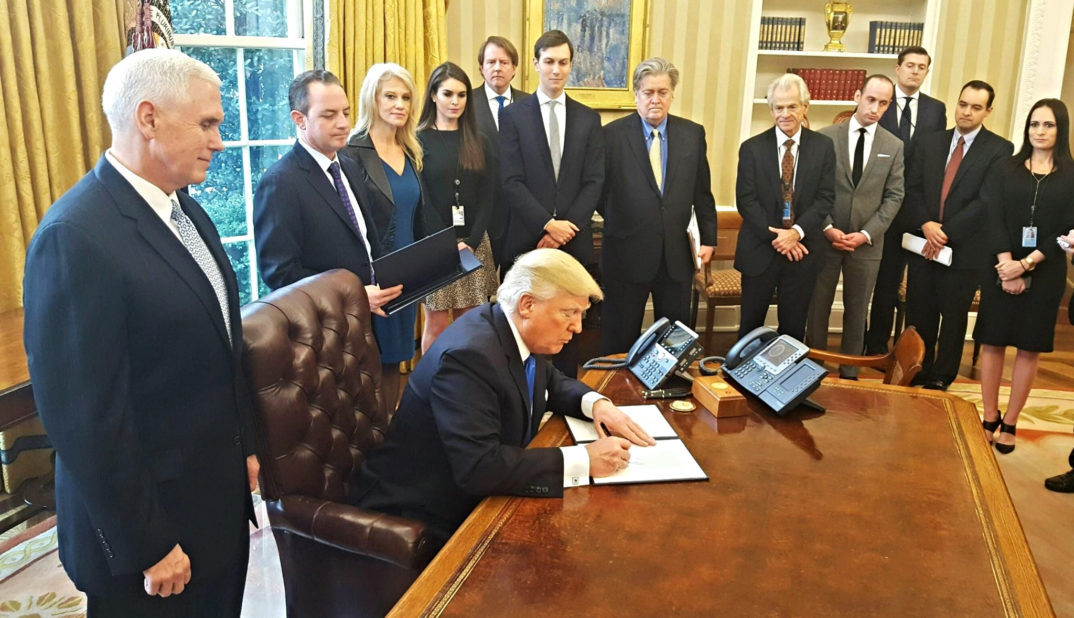On The Times Op-Ed: Ethics of Anonymous Sources
In light of a recent op-ed published by The New York Times, the validity of using anonymous sources in journalism has once again been brought into question. The op-ed, released to the public on September 5, was allegedly written by a senior official within the Donald Trump administration, and details an underground resistance against the President within his own staff. “[M]any of the senior officials in his [Trump’s] own administration are working diligently from within to frustrate parts of his agenda and his worst inclinations,” reads the piece. “I would know. I am one of them.”
The author then goes on to detail why this resistance is being executed, saying that Trump has blatantly attacked conservative values of “free minds, free markets, and free people,” and that his notion of mass media as the enemy of the people is “anti-democratic.” Further, the anonymous writer stated the goal of the White House resistance as being “to keep bad decisions contained to the West Wing.” Sometimes this could be as simple as swiping papers from the President’s desk. In his book, Fear: Trump in the White House, celebrated journalist Bob Woodward details how Trump’s ex-economic advisor, Gary Cohn, stopped the President from terminating a trade deal with South Korea by taking a letter off his desk in the Oval Office.
Perhaps more intriguing than the contents of the op-ed itself, however, is the shrouded identity of its author. A number of theories about who in the administration could have written it have surfaced, including opinions from filmmaker Michael Moore and former aide to Trump Omarosa Manigault Newman. The President responded to the breach in his administration’s loyalty by lashing out on Twitter and at public events, going so far as to label the op-ed as “treason” and a threat to national security. Trump also told reporters that he wants Attorney General Jeff Sessions to investigate the source of the article.
Despite the current drama surrounding the Trump administration, however, The New York Times has refused to disclose the author’s identity. A statement preceding the op-ed reads:
“The Times is taking the rare step of publishing an anonymous Op-Ed essay. We have done so at the request of the author, a senior official in the Trump administration whose identity is known to us and whose job would be jeopardized by its disclosure. We believe publishing this essay anonymously is the only way to deliver an important perspective to our readers.”
The Times’ refusal to give up the author has undoubtedly been met with criticism both by the President himself and by his supporters, boiling down to controversy over when it is permissible for publications to distribute anonymously-produced content and when it is not.
Anonymous sources are, at their root, tools for journalists to get closer to exposing truth to the public. Although not preferable, anonymity protects people who hold incriminating or scandalous information from consequences upon revealing this information, which may sometimes be the only way of getting those people to talk. However, in today’s era of intense beat journalism, anonymous sourcing can sometimes be used haphazardly. In May of 2005, Newsweek published an article using anonymous sources who claimed that interrogators at Guantanamo Bay desecrated the Koran to intimidate Muslim prisoners, which sparked a riot in Afghanistan resulting in the deaths of 14 people. Lawyers later disproved these statements from anonymous sources, and Newsweek retracted its article.
What separates the anonymous op-ed in The New York Times from Newsweek’s Guantanamo debacle are the articles’ respective intentions. Newsweek published their article to establish fact: interrogators at Guantanamo desecrated the Koran to intimidate Muslim prisoners. Conversely, The New York Times’ article, published as an op-ed, serves the primary function of declaring the author’s opinion: Donald Trump is failing as a president, and “there are adults in the room” who want to protect the rest of the country from his shortcomings. The point could be raised that op-eds deserve known sources as well. Opinion articles come with their own claims that, if issued by reputable publications, should be written by verifiable experts. The editors of The New York Times, however, know the identity of the op-ed’s author, and given their reputation as a responsible publication, can be trusted to have thoroughly vetted their source’s claims. Given that The Times is a left-leaning publication, some of this criticism may be indirectly stemming from partisanship. Had this op-ed been published from a right-leaning publication, its relationship with public trust may have looked different. Moreover, it could be argued that the article’s groundbreaking content and consequences that will arise if the author’s identity is compromised outweighs the need for a publicly-known source.
Whether one believes this to be an act of heroism or treason by The New York Times, it is difficult to refute that this piece could change the way the public and journalists view anonymous sources. An anti-establishment culture that has budded in the past few decades has heightened the need for anonymous sourcing in journalism, and facing this phenomenon is essential to rebuilding the relationship between mass media and the public. Even if The New York Times was wrong in publishing this op-ed, they sparked conversations around journalism ethics that need to be had outside of the newsroom.





